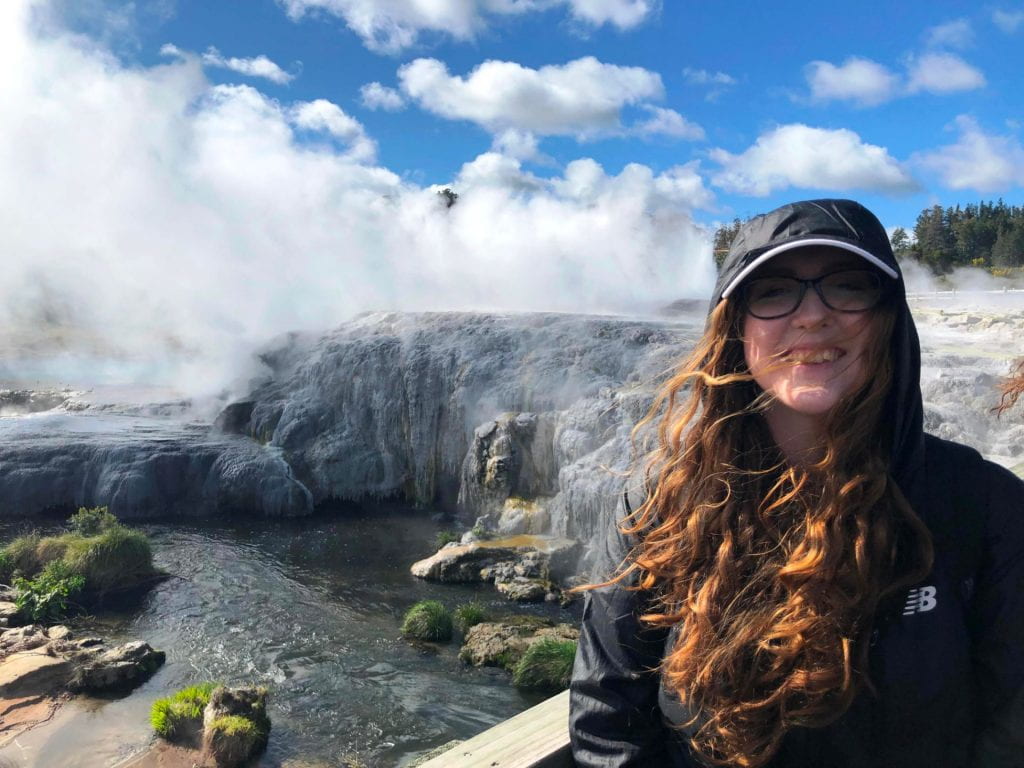
Submitted by Kylie Boggs on the 2019 World Scholars fall semester program in New Zealand…
I’ve been studying in Auckland for over a month now, and New Zealand never ceases to amaze me. The first-year cohort of World Scholars and I went on an excursion in Rotorua today, with our lovely staff member Mai who guided us through our itinerary. Now, I love the city, but there are some things that just can’t be beat, and the great outdoors is one of them! Standing inches away from boiling sinkholes, geysers, and waterfalls all day really connects you with your sense of adventure. More incredible, though, is the relationship that the native Māori people have with the natural landscape. Our guide in Te Puia, who happened to be a “Māori Princess” by ancestry, was able to list off the history of each geographic feature and tell you how her ancestors would interact with it and how she would interact with it as a child. She told us about how their “gods” are not gods “of” anything, the god of the sea is also the sea itself and its creatures are its family. The New Zealand Māori Arts and Crafts Institute demonstrated its students’ deep respect for the native materials that they used. Our tour guide in Hell’s Gate, a Māori-owned region with a mud bath and spa, demonstrated an intimate, almost magical relationship with the geysers and vents as he asked them to clear away their steam for us to grant us a great view (“like Gandalf” in his words). Each and every person who steered us through our day was a living example of what I had been learning from my Maori Studies course here in Auckland. Specifically, in Māori culture, humans are meant to inhabit a Tuakana/Teina relationship with the world, meaning that the physical world is our older sibling (Tuakana), and while it protects and sustains us, it is our responsibility as the younger peer (Teina) to support and guide it.
This sentiment is difficult to grasp sometimes, especially when you’re used to living in either a big city or, in my case, a country that places more value on industrialism over naturalism. Our modern world can obfuscate the deep and useful knowledge that can be gained and nurtured from the world around us, and many of us have lost such a deep sense of familial connection with our home. However, the moment I felt this worldview with the most clarity came when I heard the heartbeat of the earth. There was one geothermal vent that was spewing steam from a hole that travelled deep beneath our very feet. The beating of the underground rivers was palpable, and the earth sounded alive – and I was shocked. I had never been this close to the under-workings of the land that holds me up every day. Maybe it was the unique geothermal nature of the region, but I couldn’t help, but apply that heartbeat to everywhere that I had called home in my life, and it made sense to me. The string of connection that ever allowed me to feel at home when I reached a certain location wasn’t just about a series of associations and time spent, it was an active relationship with the ground beneath my feet that I had never truly acknowledged. I’m grateful to be aware now, and I hope to carry my relationship with the land of New Zealand with me throughout my life.


